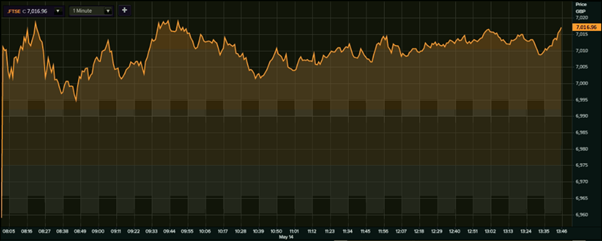Summary
- UK shares regathered pace with the extended support from Wall Street
- FTSE 100 retook 7,000, after losing the crucial support on Monday
- Macroeconomic data is likely to skew the market direction next week
UK shares regathered pace on Friday, 14 May, following the extended support from Wall Street with all the three major stock indices recovering after three-day rout led by the fears of rising inflation in the United States.
The marginal comeback of London equities on Wednesday was largely offset by the losses realised on Thursday. In the present week, the stock markets across the globe have remained volatile, well-initiated by the sell-off in tech stocks with the Nasdaq Composite diving more than 2.5 per cent on the first session of the week.
The bulls have somehow managed to allay the bearish pressure, partly during the week, mostly driven by a meaningful upsurge on Wall Street.
FTSE 100 retook a level over 7,000, after losing the battle to the bears on Monday. According to the latest data available with the London Stock Exchange, FTSE 100 recorded an intraday peak of 7,019.61, it was trading at 7,017.10, up 0.77 per cent from the previous close of 6,963.33.
FTSE 100 chart (14 May)

(Source: Refinitiv, Thomson Reuters)
Other broader indices traded in a largely similar fashion with the mid-cap focused FTSE 250 rising over 0.80 per cent.
Investors have shifted their eyes to the upcoming data points, as a bunch of macroeconomic data will be announced in the next week including the rate of unemployment, inflation, claimant count, retail sales, and Gfk consumer confidence.
Also Read | Are Bitcoin Chartists Picking Bearish Signals?
The Covid-19 activity in the Asian subcontinent with India reporting record-breaking rise in the number of cases, of late, has seemingly pacified in the present week. However, the rate of infection still remains at a higher side with more than 300,000 cases per day since Monday.
Given the persisting global situation with some parts of the world witnessing multiple phases of reopening, including the United Kingdom, whereas, some countries have left with no choice to impose the lockdowns, once again.
Regional governments in India have repeatedly extended weekly lockdowns, while Japan has extended the state of emergency in many jurisdictions including Tokyo and Kyoto unti the end of May ahead of the delayed Olympics.
The renewed pandemic restrictions have been purportedly put in place by the authorities in a desperate bid to contain the massive upswing in the rate of infection, at a time when the countries are yet to receive the adequate number of Covid vaccine vials that will be enough to inoculate the whole population, excluding the uncontrolled wastage.
.jpg)




